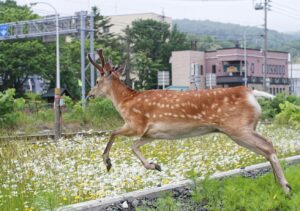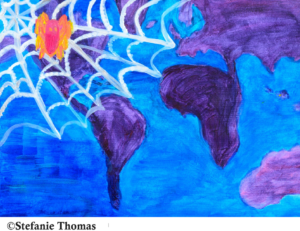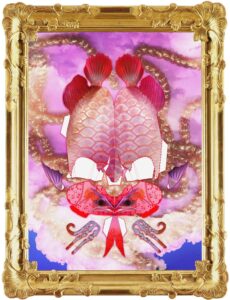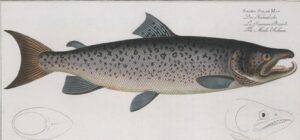May 27 2024 (online)
Pigeons, Tigers, and Vampire Bats: On Ethnonationalism, Hospitality, and Kinship in South Asia (Chair: Radhika Govindrajan)
[Abstracts/bios]
This panel explores South Asian fables about human relationships with more-than-human entities. Drawing on songs, films, and stories about bats, pigeons, tigers, and elephants, the panel explores how “folktales”, old and new, animate questions of ethnonationalism, militarization, hospitality, and kinship.
 Muhammad Kavesh (Australian National University), Ethics of Welcoming Pigeons in Pakistan
Muhammad Kavesh (Australian National University), Ethics of Welcoming Pigeons in Pakistan
Dolly Kikon (University of California, Santa Cruz), Tiger, Spirit, Man: Creation Journey and Relationship in the Naga World
Mythri Jegathesan (Santa Clara University), Vampire bats, white blood, and thirsty elephants: fabulating ethnonationalism on Sri Lanka’s plantations
Global Fables
September 12-13, 2024 (online)
The fable stands as a truly global genre. Animal stories are ubiquitous in most cultures, and many fables have travelled across languages, cultures, and regions, changing shape to adapt to new societies, while playing a crucial role in knitting our worlds together.
This two-day online symposium explores the global tradition and circulation of fables by engaging with stories in many languages and from diverse cultures, including South Asian and Middle-Eastern fables, and transatlantic fables featuring tricksters such as Brer Rabbit and Anansi. We also consider contemporary reworkings of fables, and how these stories shed light on our understanding of other species and the entanglement of nonhumans in regional and global politics. Throughout the symposium, we will approach the fable as a vibrant living tradition, recognising the power of animal storytelling to address pressing issues such as the environmental crisis and other global challenges.
September 12
 9-11am (UK time) Welcome & Fables from Asia
9-11am (UK time) Welcome & Fables from Asia
Shonaleeka Kaul (Jawaharlal Nehru University) The ‘Antinomic Didactic’: Rethinking Fable in the Indic Tradition
Kelsey Granger (Ludwig Maximilians University) Till Debt Do Us Part: Medieval Chinese Buddhist Tales of Human Debt and Animal Rebirth
Tangiku Itsuji (Hokkaido University /CAIS), Characteristics of Ainu Fables
Shreyasi Sharma, What the Bird Had: Noticing Nonhuman life and Writing through Fables
 1-2:45 pm (UK time) Anansi and Bre’r Rabbit: Transatlantic fables
1-2:45 pm (UK time) Anansi and Bre’r Rabbit: Transatlantic fables
Rachael Pasierowska (Lincoln University), Bre’r Rabbit and Buh Fox in African American Storytelling as Education of Enslaved Children in the Antebellum U.S. South to Linguistic Approaches in Pedagogy Today
Emily Zobel Marshall (Leeds Beckett University), Postcolonial Tricksters: African Diasporic Folklore in Contemporary Culture
Winsome Monica Minott (University of Kent), You can Bet on Ananse
3:00- 4:45 (UK time) African Fables
 Elleke Boehmer (Oxford), Narrative intervention and the African hyena folktale
Elleke Boehmer (Oxford), Narrative intervention and the African hyena folktale
Luan Staphorst (Oxford), Storying Contiguity: |xam poetics of the animal and questions of reading
Tinashe Mushakavanhu (Oxford), Fabled up histories: an archive against censorship
5:00-6:00 (UK time)
Josie Rae Turnbull, The Fabled Fortunes of A Fish: Sunset of the Arowana Industry [recording]
 The Sparkle of the Kin employs my concept of ‘Factual Fable’ to investigate the complex relationships between humans and the Arowana fish, contextualising these interactions within the colonial histories of Malaysia and Singapore. By casting Arowana fish as Actant, this ongoing visual art project critiques their transformation into ‘lively commodities’ within the luxury ornamental fish industry, where their value is constructed through manufactured scarcity, and enhanced through cosmetic surgeries. Informed by material experimentation, literary and historical research, my work delves into the legacy of British colonialism and extractivist industries such as rubber, tin, and palm oil in the region. The narrative of the Arowana — an endangered species subject to mass production and the fickleness of human taste, echoes the environmental and social impacts of these industries. By reimagining the traditional didactic role of fables, The Sparkle of the Kin challenges conventional ways of perceiving and constructing animals, questioning whether recent ethical advances truly protect animals that are still treated as marketable goods. I visualise the imagined fate of an Arowana fallen from grace – a former champion, now cast aside. Littered with the ephemera of success – rosettes, certificates, and branded merchandise – there is a sense of tragedy woven into the works, asking us to consider the true cost of our desires. My studio practice prioritises everyday consumer items; false nails, broken toys, doilies, juxtaposed with repurposed fast fashion garments and textiles – the aftermath of overproduction and consumption. The mediums mirror the rapid cycle of desirability familiar to the Arowana and much like the tragic arc of the fish’s stardom, reminds us of the daunting lifespan of consumer goods, that far exceeds their moment in the spotlight.
The Sparkle of the Kin employs my concept of ‘Factual Fable’ to investigate the complex relationships between humans and the Arowana fish, contextualising these interactions within the colonial histories of Malaysia and Singapore. By casting Arowana fish as Actant, this ongoing visual art project critiques their transformation into ‘lively commodities’ within the luxury ornamental fish industry, where their value is constructed through manufactured scarcity, and enhanced through cosmetic surgeries. Informed by material experimentation, literary and historical research, my work delves into the legacy of British colonialism and extractivist industries such as rubber, tin, and palm oil in the region. The narrative of the Arowana — an endangered species subject to mass production and the fickleness of human taste, echoes the environmental and social impacts of these industries. By reimagining the traditional didactic role of fables, The Sparkle of the Kin challenges conventional ways of perceiving and constructing animals, questioning whether recent ethical advances truly protect animals that are still treated as marketable goods. I visualise the imagined fate of an Arowana fallen from grace – a former champion, now cast aside. Littered with the ephemera of success – rosettes, certificates, and branded merchandise – there is a sense of tragedy woven into the works, asking us to consider the true cost of our desires. My studio practice prioritises everyday consumer items; false nails, broken toys, doilies, juxtaposed with repurposed fast fashion garments and textiles – the aftermath of overproduction and consumption. The mediums mirror the rapid cycle of desirability familiar to the Arowana and much like the tragic arc of the fish’s stardom, reminds us of the daunting lifespan of consumer goods, that far exceeds their moment in the spotlight.
Josie Rae Turnbull (b.1991) is a multi-disciplinary artist and art facilitator, currently based in London. She completed her MA in Fine Art and Science at Central Saint Martins in 2022, following a number of years living in Ho Chi Minh City. Her work across textiles, sculpture, printmaking and lens-based media is impelled by research into absurd, fabulist ‘case studies’ of animal protagonists revealing human failings. Throwaway consumer tat is refashioned through bricolage and material glitches. The life cycles of various industries, and their uncanny fall-outs, are reconstituted through a visual language led by artificial colour relationships and material glitches. She is fascinated by a feature common to aesthetics of microscopic imaging, and the concept of the hyperreal – that of using the ‘absolute fake’ to better see the ‘real’ thing.
September 13
9: 45-10:00 am (UK time)
Beatrice Gründler, Kalīla and Dimna – AnonymClassic / Arabic Literature Cosmopolitan
10.00 – 11.45 am (UK time)
Continuity and Circulation of Fables in the Circum-Mediterranean (Chair: Dr. Christoph Lange)
 The panel explores the circulation and continuity of the fable genre in the wider Mediterranean and Arab region from a multidisciplinary and comparative perspective. The panel’s three experts will present a unique fable tradition: Arabic language and literature scholar Kevin Blankinship (Brigham Young University), who is an expert on the works of the medieval Arabic scholar and controversial freethinker Abu al-Ala’ al-Ma`arri, will introduce to us Islamic animal ethics in medieval Arabic literature. Environmental humanities philosopher Mariagrazia Portera (University of Florence), who works on aesthetics and biodiversity conversation, presents Giacomo Leopardi’s Moral Fables or Operette morali (1824 -1832) and how his work forestalls the eco-literary discourse. Environmental humanities and English literature scholar Heidi Bayoumy (Cairo University), whose research focus lies on contemporary children’s literature and how these relate to disaster stories, will present the role of fables in Arabic children’s books. The panel will identify certain topoi associated to these specific genealogies of fables and connect them through time and place, asking how these might contribute to contemporary fabulous stories as well as the Rethinking Fables project?
The panel explores the circulation and continuity of the fable genre in the wider Mediterranean and Arab region from a multidisciplinary and comparative perspective. The panel’s three experts will present a unique fable tradition: Arabic language and literature scholar Kevin Blankinship (Brigham Young University), who is an expert on the works of the medieval Arabic scholar and controversial freethinker Abu al-Ala’ al-Ma`arri, will introduce to us Islamic animal ethics in medieval Arabic literature. Environmental humanities philosopher Mariagrazia Portera (University of Florence), who works on aesthetics and biodiversity conversation, presents Giacomo Leopardi’s Moral Fables or Operette morali (1824 -1832) and how his work forestalls the eco-literary discourse. Environmental humanities and English literature scholar Heidi Bayoumy (Cairo University), whose research focus lies on contemporary children’s literature and how these relate to disaster stories, will present the role of fables in Arabic children’s books. The panel will identify certain topoi associated to these specific genealogies of fables and connect them through time and place, asking how these might contribute to contemporary fabulous stories as well as the Rethinking Fables project?
Mariagrazia Portera (University of Florence / MESH), Fables for the Anthropocene: birds, sprites and sylvan roosters in Giacomo Leopardi’s ‘Small Moral Works’
Heidi Mohamed Bayoumy (Cairo University), Revisiting Ecological Fables: An Ecocritical Reading of Selected Arabic Animal Stories and Plays for Children
Kevin Blankinship (Brigham Young University) Al-Maʿarrī’s Ultra-Short Ascetic Animal Stories
2-4pm (UK time) Future global fables
 Gro Birgit Ween (University of Oslo), Mythical origins to contemporary conversations with salmon
Gro Birgit Ween (University of Oslo), Mythical origins to contemporary conversations with salmon
Carrie Dohe (Cologne, MESH), Bees for Peace
Hadar Elyashiv (Israel Oceanographic & Limnological Research) and Camila Neder (IDEA-CONICET/Universidad Nacional de Córdoba), Once upon a time … a scientific fairy tale
Cameo Marlatt, Guillem Rubio-Ramon, and Shawn Bodden (University of Edinburgh), Future fables: Re-learning to live with animals through place-based writing workshops